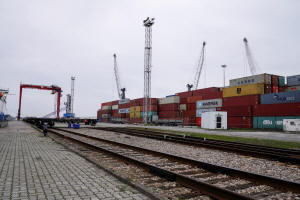Moscow fumes after EU cuts off shipments to Baltic outpost
 Send a link to a friend
Send a link to a friend
 [June 21, 2022]
KYIV (Reuters) -Russia summoned the
European Union's ambassador in Moscow on Tuesday, fuming over what it
calls an illegal rail blockade of a Russian outpost on the Baltic Sea,
the latest stand-off over sanctions imposed over the war in Ukraine. [June 21, 2022]
KYIV (Reuters) -Russia summoned the
European Union's ambassador in Moscow on Tuesday, fuming over what it
calls an illegal rail blockade of a Russian outpost on the Baltic Sea,
the latest stand-off over sanctions imposed over the war in Ukraine.
On the ground in eastern Ukraine, Russia's separatist proxies said they
were advancing towards Kyiv's main battlefield bastion. A Ukrainian
official described a lull in fighting there as the "calm before the
storm".
The latest diplomatic crisis is over the Kaliningrad enclave, a port and
surrounding countryside on the Baltic Sea that is home to nearly a
million Russians, connected to the rest of Russia by a rail link through
EU- and NATO-member Lithuania.
Lithuania has shut the route for basic goods including construction
materials, metals and coal, which it says it is required to do under EU
sanctions that took effect on Saturday.
Russia calls the move an illegal blockade and has threatened unspecified
retaliation against Lithuania.
EU envoy Markus Ederer appeared at the Russian Foreign Ministry on
Tuesday. EU spokesperson Peter Stano said Ederer "explained that
Lithuania is implementing EU sanctions and there is no blockade, and
asked them to refrain from escalatory steps and rhetoric".

The standoff creates a new source of confrontation on the Baltic, a
region already set for a security overhaul that would hem in Russia's
sea power as Sweden and Finland apply to join NATO and put nearly the
whole coast under alliance control.
Nikolai Patrushev, secretary of Russia's powerful Security Council,
arrived in Kaliningrad to hold a council meeting, Russia's RIA state
news agency reported.
Moscow had summoned a Lithuanian diplomat on Monday, but the EU has
deflected responsibility from the Lithuanians, saying the policy was a
result of collective action by the bloc. Vilnius was "doing nothing else
than implementing the guidelines provided by the (European) Commission",
said EU foreign policy chief Josep Borrell.
HEAVYWEIGHT FIGHT
Within Ukraine, the battle for the east has become a brutal war of
attrition in recent weeks, with Russia concentrating its overwhelming
firepower on a Ukrainian-held pocket of the Donbas region that Moscow
claims on behalf of its separatist proxies.
Moscow has made slow progress there since April in a relentless fighting
that has cost both sides thousands of troops killed, one of the
bloodiest land battles in Europe for generations.
[to top of second column]
|

A view shows railway tracks at a commercial port in the Baltic Sea
town of Baltiysk in the Kaliningrad region, Russia October 28, 2021.
REUTERS/Vitaly Nevar

The fighting has spanned the Siverskyi Donets river
that curls through the region, with Russian forces mainly on the
east bank and Ukrainian forces mainly on the west, though Ukrainians
are still holding out in the east bank city of Sievierodonetsk.
In recent days Russia has captured Toshkivka, a small
city on the west bank further south, giving it a potential foothold
to try to cut off the main Ukrainian bastion at Lysychansk.
Rodion Miroshnik, ambassador to Russia of the pro-Moscow separatist
self-styled Luhansk People's Republic, said forces were "moving from
the south towards Lysychansk" with firefights erupting in a number
of towns.
"The hours to come should bring considerable changes to the balance
of forces in the area," he said on Telegram.
The governor of Ukraine's surrounding Luhansk region said Russian
forces had gained some territory on Monday. It was relatively quiet
overnight, but more attacks were coming, Serhiy Gaidai said: "It's a
calm before the storm".
Although fighting has favoured Russia in recent weeks because of its
huge firepower advantage in artillery, some Western military
analysts say Russia's failure to make a major breakthrough so far
means time is now on the Ukrainians' side.
Moscow is running out of fresh troops, while Ukraine is receiving
newer and better equipment from the West, tweeted retired U.S.
Lieutenant General Mark Hertling, a former commander of U.S. ground
forces in Europe.
"It's a heavyweight boxing match. In 2 months of fighting, there has
not yet been a knockout blow. It will come, as RU forces become more
depleted," Hertling wrote.

Dmitry Muratov, editor of Novaya Gazeta, one of Russia's last
independent newspapers, auctioned off a Nobel Peace Prize he had won
last year, raising $103.5 million for UNICEF to help Ukrainian
refugees. The anonymous buyer bid for the medal by phone at the
auction in New York.
Novaya Gazeta, like all other independent media in Russia, has
halted publication since Moscow enacted a ban on reporting that
departs from the official account of the "special military
operation" in Ukraine.
(Reporting by Reuters bureausWriting by Peter GraffEditing by Nick
Macfie)
[© 2022 Thomson Reuters. All rights
reserved.]
This material may not be published,
broadcast, rewritten or redistributed.
Thompson Reuters is solely responsible for this content. |